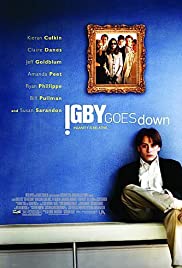
IGBY GOES DOWN
US, 2002, 98 minutes, Colour.
Kieran Culkin, Ryan Philippe, Susan Sarandon, Jeff Goldblum, Amanda Peet, Jarrod Harris, Bill Erwin, Cynthia Nixon, Eric Bogosian, Rory Culkin.
Directed by Burt Steers.
The poster for Igby notes that the Slocumb family in this film make the Royal Tennenbaums seem normal. There's a lot in that claim. What we see is an extremely dysfunctional family, embodying all the ills and quirks of , at least, contemporary USA. It opens with Igby (Kieran Culkin in an intelligent performance of a difficult role) and his brother, Oliver (Ryan Philippe, speaking as usual in a kind of strangulated preppie manner) assisting their mother (Susan Sarandon as a self-absorbed snob) to commit suicide.
As the film flashes back, we are given portraits of the two boys, Oliver the perfect one and Igby always in trouble and having to continually move schools, their nice father (Bill Pullman) who is about to experience a schizophrenic collapse and their controlling mother. When Igby runs away from military college, he ends up in New York working for his entrepreneur godfather (Jeff Goldblum), his girlfriend (Amanda Peet) and her camp, drug-dealing artist friend (Jared Harris). The only bright spot is friendship with an older girl named Sookie (Claire Danes).
Igby is depressed, confused, comparing himself to his brother. He loathes his mother, clashes with his godfather over an entanglement with his girlfriend and is reduced to being a drug courier. His dream is of escaping everyone and going to California. It is his mother's illness that brings things to a head, a little more optimistically than the rather black screenplay would have led us to believe. What we have is a gallery of eccentric characters acting in absurd ways, often with a clever way with words, materialistic and self-centred. Satire is an art form that enables the creator to mock society while implying that it should be so much better. That seems to be the intention of writer-director, Burr Steers.
1. A jaundiced view of American society? The beginning of the 21st century? Humour, seriousness, irony?
2. The Washington and New York settings, affluent apartments, the range of schools and academies, the affluent society, art galleries? The contemporary score and songs?
3. The title, the focus on Igby, his experiences, being put down, contemplating situation - but recovering and going up instead of down?
4. The opening, the two brothers, their ill mother, putting the plastic bag over her? The resumption of this scene at the end? Ollie and Igby at their mother's side, grief, hatred? Ollie telling Igby that he was D.H's son? Igby and the impact, yet going to the funeral and observing?
5. The film as a retrospect from the death of the mother? The focus on Mimi, Jason, their manners, wealth, style? At table, manners, snobbery? The contrast between Ollie and Igby? The criticism of Igby? Jason, his mental collapse and breakdown, coming naked into the room? His going to the institution? Mimi and the school interviews, the priest, the military academy? Her illness? Her relationship with D.H? Trying to cope with Igby, trying to cope with her lifestyle and status? Her illness, its increasing, her final decision?
6. The portrait of Igby, his age, experience at home, relationship with Jason, Ollie being set up as a successful model? Mimi putting him down? His behaviour at the schools and his expulsion? Going to the military academy, with the other cadets, with the officer, his escape, going to the hotel, using the credit cards, his being found by the officer? Going to D.H., D.H. as his godfather? Meeting Rachel, looking at the relationship between D.H. and Rachel? His going to work for D.H? The meeting with Sookie and her comment on his name, his retort? Becoming friends, sharing experience together? The sexual relationship? Ollie and his success, rivalling him, seducing Sookie? Igby and his continually being glum? The sexual encounter with Rachel? D.H. and his beating him? His going to live with Russell, delivering the drugs? The clients that he delivered drugs to? The growing depression, feeling alone, asking Sookie's aid? His going to visit his father in the institution? The comfort of Sookie, the end and his going to California after the funeral?
7. The picture of Ollie, well-manners, well-spoken, schools, academic success? The continued rivalry with Igby, the comparisons? His condemning Igby as being in a mess? The seduction of Sookie? His presence at his mother's death, the two brothers, the revelation about Igby's father?
8. Jason, marrying Mimi, the children, his madness? Igby visiting him in the asylum?
9. D.H. as an entrepreneur, his lifestyle, his keeping Rachel? His relationship with his wife? Work, apartments? The socials? His fostering Igby's career? Attacking him in jealousy? Did he know that he was Igby's father?
10. Rachel, as a dancer who couldn't dance, drug addict, D.H's mistress? The drugs, her friendship with Russell? The relationship with Igby? Russell, his friends, sexuality, drugs? Their support of Igby?
11. The range of visual and verbal satire? The one-liners, the irony? The comment on American society, a critical perspective?